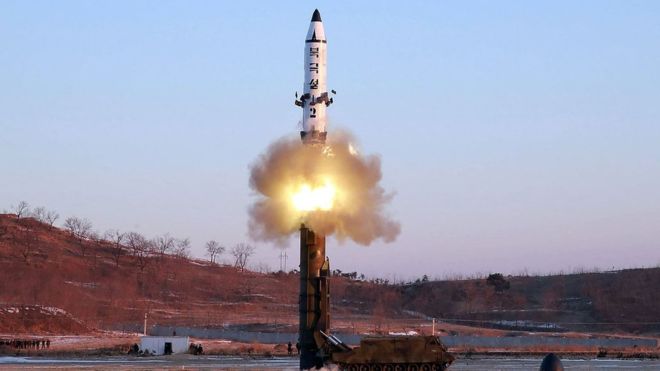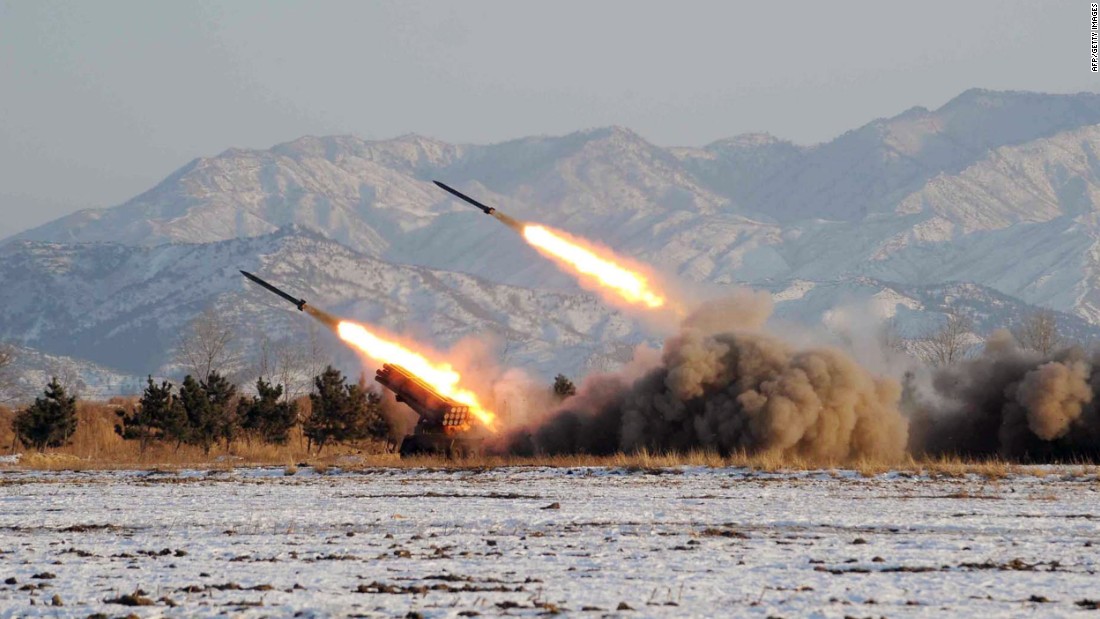by Brian Hioe
語言:
English
Photo Credit: KCNA
MANY QUESTIONS for regional peace in the Asia Pacific are up in the air after a failed missile test by North Korea today. It was speculated that North Korea may launch a nuclear missile test today to commemorate the birthday of Kim Il-Sung on April 15th. This would fit in with the past pattern of Korean nuclear tests. However, the Trump administration has stated that it would take steps to “deal with” North Korea if North Korea went forward with nuclear testing. Today’s missile test was not a nuclear missile test, but coming on the heels of North Korean missile systems being shown off at a military parade yesterday, it may precede such a test, and tensions will only increase in the Asia Pacific region after the test.
What steps America would take in the event of a nuclear test by North Korea are questionable, although some have raised the possibility of a preemptive strike by the US or even the specter of thermonuclear war between the US and North Korea as possibility. A US air carrier strike group was deployed to the Korean peninsula in preparation for possible actions necessitating responses from North Korea. Recent American military actions across the world, such as the deployment of MOAB bomb in Afghanistan, or missile strikes in Syria, also seemed intended to send a message to North Korea to back down.
But, of course, it is a fanciful belief to think that anything to the extent of thermonuclear war would break out between America and North Korea, though this is obviously a narrative with enough sensational appeal to gain traction in elements of the media. To begin with, as the missile test—which failed immediately—indicates, North Korea is probably far from having the ability to lob nuclear death and destruction across neighboring Asia Pacific countries or the West Coast of the United States, as sometimes is claimed.
 Photo credit: KCNA
Photo credit: KCNA
North Korea’s nuclear and missile tests more often fail than not, regardless of what some claim about North Korea’s theoretical strike capabilities. Today’s missile test is a similar case. Oftentimes the critique of North Korean actions by Asia Pacific nations is actually a cipher for criticism of China. North Korea’s rogue actions, then, provide easy justification for Asia Pacific nations allied with America to ramp up actions to contain China. One should beware of raising the specter of North Korea’s oh-so-terrifying nuclear threats when they often simply serve as justification for ramping up aggressive foreign policy.
In the past, North Korea has proved useful for China in having more or less been a proxy state which could voice the criticisms of western nations that China could not do so directly in its pursuit of acceptance into the international community. However counterintuitive, China probably in some way also found North Korea’s threats to the western world useful for China’s own geopolitical agenda in the Asia-Pacific and beyond.
Nevertheless, it is becoming more and more difficult for China to rein North Korea in. Following the Trump-Xi meeting and Trump calling on China to restrain North Korea, China took steps to place pressure on North Korea and to secure wiggle room from its diplomatic obligations to defend North Korea. Yet, as we can see through North Korea’s actions in going ahead with the missile test regardless, when pressed into a corner, North Korea is completely willing to defy China in spite of its history of being China’s proxy state.
China would likely not take steps beyond a certain extent to defend North Korea, unless America overreaches, seeing as China’s inability to keep North Korea under control is damaging to China’s international credibility. However, at the same time, one can observe that if North Korea’s supposed nuclear threat has in many cases been simply bluffs, Trump’s claims that America would take some form of action over North Korea may also have been bluffs.
What would “action” entail, for example? A costly troop invasion of North Korea which the United States probably could not fight in the Asia Pacific? More realistically, air strikes absent of a ground invasion, staged using the US carrier strike group deployed to the waters around North Korea, as has many precedents in the Middle Eastern war theater? And would this involve the declaration of war that would need to go through Congress or, more likely, would this be military action taken as an “intervention” taken without a congressional declaration of war? Either way, as his administration becomes increasingly embattled domestically, whatever Trump’s actions, he would see censure from a large aspect of his support base and it is to be questioned whether the American public would accept drastic actions by Trump on North Korea.
On the other hand, when it comes to North Korea’s decision to hold a missile test at the risk of provoking reactions from the United States and deteriorating relations with China, the ball is really in North Korea’s court on how to act from this point forward. Whatever we can say about the unpredictability of America under a Trump administration, as observed in ambiguity about possible US actions on North Korea, North Korea is even more unpredictable.
 Photo credit: KCNA
Photo credit: KCNA
Yet although a seemingly irrational move, probably North Korea did in fact see holding a missile test today as a way to call America’s bluffs and to force China to have a clearer position on North Korea. As a pariah state, North Korea very probably sees shows of force as the only way for it to have any say in international politics, hence its willingness to go ahead with moves like the missile test. North Korea also had little to lose further from its missile test, given that it already is a pariah state.
It may be that America, China, and North Korea alike have driven themselves into a corner now. There is also the possibility that regional actors normally subordinate to America may take action on their own because of the ambiguous direction of America under the Trump administration, but using American actions worldwide under the Trump administration as justification. After air strikes on Syria justified on the basis of Assad’s possession of Sarin, Shinzo Abe, for example, has taken to claims that North Korea could launch missiles equipped with Sarin at Japan. This is a possibility which has raised before in the past, but North Korea’s threat to Japan is usually spoken of in terms of its nuclear threat and so Abe raising this claims in this timeframe is suspicious. What now, for regional peace in the Asia Pacific?

